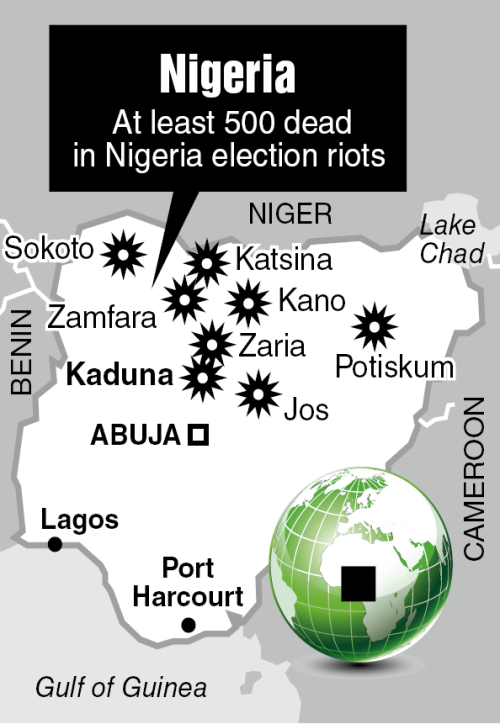BAUCHI, Nigeria (AP) ― At least 500 people died in religious rioting that followed Nigeria’s presidential election, a civil rights group said Sunday, as volatile state gubernatorial elections loom this week.
Meanwhile, police in the northern state of Bauchi said at least 11 recent college graduates who helped run polling stations as part of the country’s national youth service corps have been killed in postelection violence, while other female poll workers have been raped.

The Civil Rights Congress of Nigeria said that the worst hit area was Zonkwa, a town in rural Kaduna state, where more than 300 people died in rioting.
The Civil Rights Congress, led by a Muslim activist, said killings also took place in the towns of Kafanchan and Zangon Kataf, as well as the state capital of Kaduna.
Muslim opposition supporters began riots as results from the April 16 election showed Christian President Goodluck Jonathan had won the vote. Many here in predominantly Muslim north of Africa’s most populous nation felt the next president should have been from their region because a Muslim president died last year before he could complete his term.
Retaliatory violence by Christians soon followed, and officials say more than 40,000 people have now fled their homes. Authorities are fearful that releasing any official death toll will only prompt more fighting, but witnesses believe hundreds have been killed across the north.
The violence also took a toll on Nigeria’s National Youth Service Corps. Authorities are trying to assure members they will be safe for them to take part in Tuesday’s gubernatorial elections being held in 29 states, though some have already fled their posts.
In Bauchi state, police have arrested 68 suspects in connection with the deadly riots that were sparked by the presidential election, Police Commissioner Amana John Abakasanga told The Associated Press.
Nigeria’s National Youth Service Corps is a mandatory yearlong assignment for all Nigerians who graduate from university before the age of 30. Most serve as teachers, but the April national elections have brought extra responsibilities ― and danger ― to their work.
The founders of the program created it in 1973 to promote national unity in a country with more than 150 ethnic groups and to help reconcile Nigerians after a 31-month civil war claimed more than 1 million lives. By encouraging young graduates to explore new parts of the country, the goal was to dispel negative stereotypes.
At least four of the young poll workers were killed in Bauchi last week when an angry mob locked them inside their youth hostel and set it ablaze. The vote for governor has been delayed in Bauchi and Kaduna states until Thursday because of security concerns there.








![[Today’s K-pop] Blackpink’s Jennie, Lisa invited to Coachella as solo acts](http://res.heraldm.com/phpwas/restmb_idxmake.php?idx=644&simg=/content/image/2024/11/21/20241121050099_0.jpg)